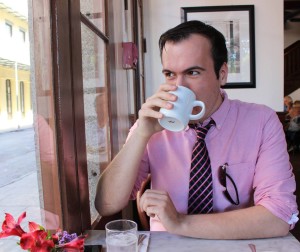Is being geek really chic?
October 18, 2013
The geek-chic fashion trend has certainly enjoyed a steady popularity increase since the mid-2000s; however, does that mean society is ready to positively perceive what many consider to be a derogatory stereotype? The Daily, Case Western Reserve University’s digital newsletter, is apparently ready to make this leap.
Earlier this month, The Huffington Post re-published HerCampus.com’s 2013 ranking of the geekiest colleges. (HerCampus.com is a lifestyle website targeted at college-age women.) Because Case Western Reserve appeared in the top ten list, The Daily published a link to the The Huffington Posts’ version of the ranking in its Oct. 14 edition.
But is being among the nation’s geekiest colleges something to tout in the official university newsletter? I’m not so sure.
The Huffington Post opted not to include the descriptions penned by HerCampus.com for each ranked instituion. And a quick trip to the original article reveals why; the website pulled no punches when deciding which schools, for better or worse, made the list.
“While one student on StudentsReview gave the school a A- for Educational Quality, Case Western bombed the Social Life category with a big, fat F,” HerCampus.com wrote. They also directed users to the Urban Dictionary definition of Case Western Reserve, which states the campus’ men believe “having a better computer is more important than a girlfriend.”
Clearly that author doesn’t appreciate geek-chic either.
I’m a firm believer that Case Western Reserve needs to move away from its geek-ridden reputation. Does this mean the university should steer clear of intelligent students when recruiting? Absolutely not. Does it mean it should strengthen its search for well-rounded, as well as intelligent students? You bet.
Since my freshman year, Case Western Reserve has done an increasingly better job at attracting and enrolling students who see their academic career as only a portion of their overall college experience. But there is more work to be done.
There are still too many undergraduate students who believe a study session in Wade Commons proceeded by a few good hours playing League of Legends makes for the perfect Friday night. There are too many students who would rather read a book than talk to a peer. There are too many students who prefer isolation to collaboration.
There are numerous student organizations at Case Western Reserve that struggle to fill their membership rosters, and the same overachieving undergraduates are left to fill several leadership positions at once.
The university needs more well-rounded students who accentuate their academic career with leadership roles, hobbies and social activities. After all, scholastic achievement is not the sole benchmark of the student experience. But it is the only one for which Case Western Reserve is nationally known.
Tyler E. Hoffman
EXECUTIVE EDITOR



Joshua Terchek • Oct 22, 2013 at 4:02 pm
When I enrolled at CWRU as an undegrad, I also thought it was geeky place and seriously thought about leaving. Now my much older and wiser self thinks that if I had accepted my fellow classmates for who they were (and what they enjoyed doing), I probably would have been much happier here, made a lot more friends, and been a better person. As Susan Cain’s book “Quiet” (coincidentally this years common reading) contends, introverts are undervalued in society, a facet of life you seem to be enforcing. Your article begs the question, “Do introverts have a place at CWRU?” To me, it is somewhat egotistical for anyone to suggest that their values and their ways of being are superior, that if only there were just more students like themselves, CWRU/the world would be better place for everyone.
In regards to the university embracing the “Geek” label, a) there is no such thing as bad press b) that list has some of the best institutions in the country on it. c) using urban dictionary and one students review on Studentsreviews.com seem like a terrible way to judge an entire institution. As someone who considers himself a geek, I am proud to be on that list. I also find it amazing how people embrace the label of geek when it suits them. http://i.imgur.com/esbX7Fr.png